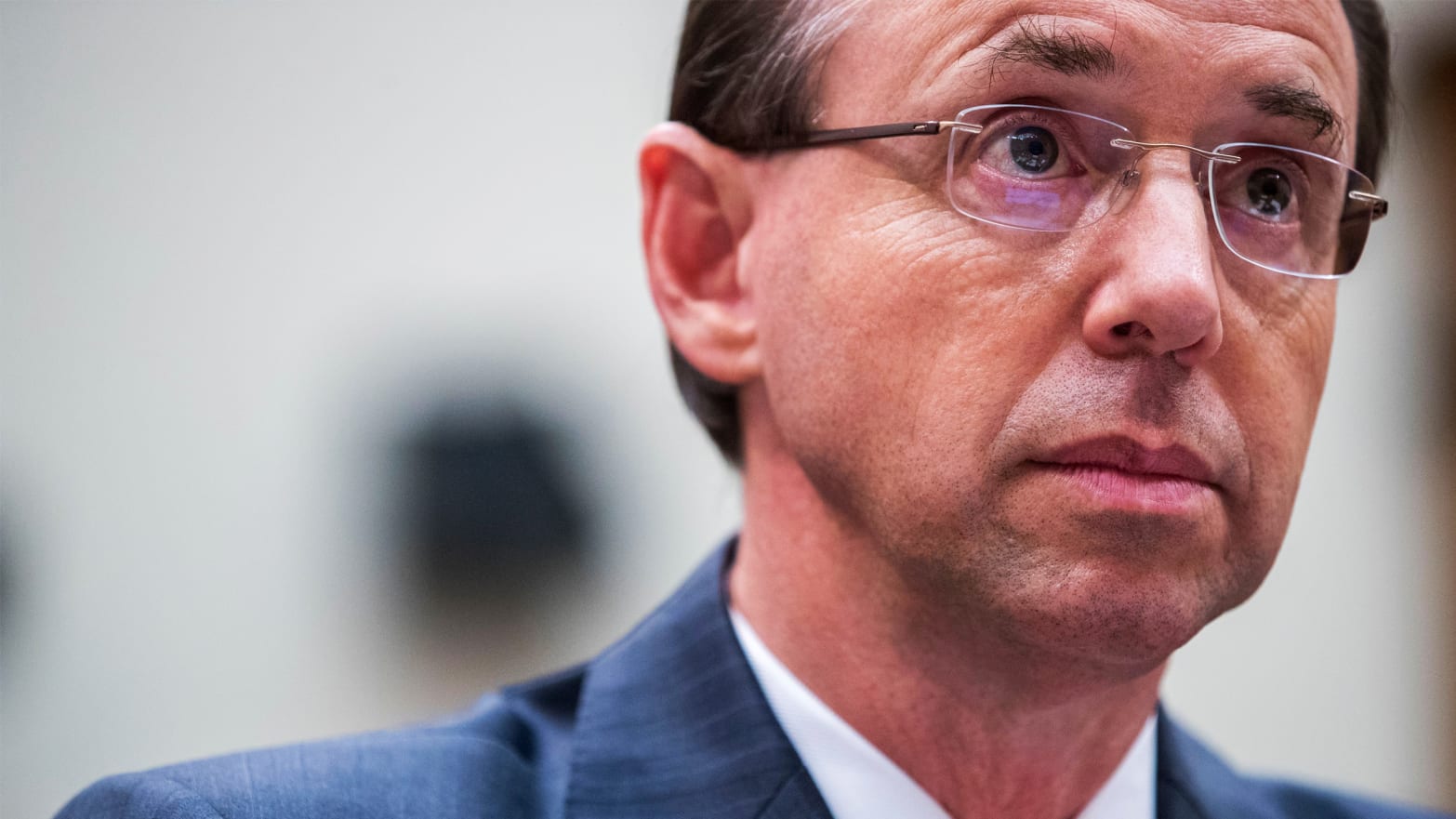After initially summoning Deputy Attorney General Rod Rosenstein to an in-person White House meeting, and then postponing that meeting, President Trump invited Rosenstein to fly with him Monday on Air Force One.
The confab comes after a September New York Times report that Rosenstein had contemplated secretly recording the president and invoking the 25th Amendment (claims denied by Rosenstein) prompted the president’s original call for a meeting. The president on Monday said he does not intend to fire Rosenstein—at least not now. Firing or no firing, the meeting itself poses a threat to the independence of special counsel Robert Mueller’s probe into the president, which Rosenstein oversees.
Assuming Rosenstein remains for now in his position, the very fact that the president has summoned him for a face-to-face meeting poses a threat to the continuing independence of the special counsel. The meeting itself smacks of a loyalty test. In the mafia cases that we used to prosecute, the Boss would “send for” any of his subordinates for any reason, any time. If “sent for,” the subordinate would go on command and answer to the Boss, typically to reaffirm his loyalty to the Boss and the mob family.
During last month’s press conference, when asked if he planned to fire Rosenstein, Trump responded that Rosenstein “said he has a lot of respect for me, and he was very nice, and we’ll see. I would certainly prefer not doing that.” In the very next breath, the president stated, “there was no collusion, there was no obstruction, I mean unless you call obstruction the fact that I fight back, I do fight back, I really fight back.” The president’s fairly obvious suggestion seems to be that Rosenstein’s continuing job security depends on flattering Trump and assuring Trump of his loyalty.
Trump reaffirmed his focus on loyalty over duty again Monday when he stated that he and Rosenstein now have a “very good relationship.” Trump seemingly believes that his personal relationship with Rosenstein is relevant to whether Rosenstein keeps his job as Deputy Attorney General. In fact, the two things should have nothing to do with one another. The determinative factor to Rosenstein’s job security should not be whether Trump likes or dislikes Rosenstein, or vice versa. The relevant inquiry should be whether Rosenstein performs his duties impartially and faithfully to his oath as a prosecutor to support and defend the Constitution, not Donald J. Trump.
Indeed, during a prior in-person meeting with a high-ranking law enforcement official, Trump allegedly asked then-FBI Director James Comey to drop an investigation of Michael Flynn, according to Comey (and his contemporaneous notes). That meeting, and whether the president obstructed justice by firing Comey, is now a primary focus of Mueller’s investigation.
Perhaps Trump has learned his lesson, perhaps not. But the mere fact that Trump has summoned Rosenstein for the meeting creates an appearance—at a minimum—that Trump continues to try to exert influence over Mueller. That Rosenstein is attending the meeting similarly leaves open questions of what assurances he will have to give the president to remain in place. Whether the president is as direct with Rosenstein as he allegedly was with Comey in explicitly requesting that a criminal investigation be dropped, the implication of the meeting itself, from Trump to Rosenstein, is clear: Stay in line or I’ll show you out.
Beyond the fact of the meeting itself, if the president does at some future point fire Rosenstein (or put Rosenstein in an untenable position leading him to resign), then the impact on Mueller’s investigation will be seismic. Ever since his appointment as special counsel in May 2017, Mueller has reported only to one person: Rosenstein. While we do not know for sure how much control Rosenstein has exerted over Mueller and how they have structured their reporting relationship, there certainly has been no public indication of any discord between Rosenstein and Mueller. And given the tangible results achieved thus far—dozens of indictments and convictions of several top Trump campaign officials and advisers including Paul Manafort, Michael Flynn, Michael Cohen, Rick Gates, George Papadopoulos, and others—it seems both men are aligned in seeking swift and decisive justice without regard to politics or outside influence.
That all could change very quickly if Rosenstein eventually is fired or resigns. Longer term, Trump would need to nominate, and the Senate would need to confirm, a permanent replacement for Rosenstein as deputy attorney general. Shorter term and immediately upon Rosenstein's departure, the job of overseeing Mueller would fall to Solicitor General Noel Francisco, given the temporary absence of a Senate-confirmed associate attorney general under Rosenstein. Francisco never has prosecuted a single criminal case. The notion of Mueller, one of the most accomplished federal law enforcement officials in the history of the United States, reporting to Francisco is jarring (though Mueller himself surely understands that certain high-level positions within the Department of Justice traditionally are filled by political appointees).
If Rosenstein departs, Francisco likely will take over supervision of Mueller’s work at least until nomination and confirmation of a new deputy attorney general. Presumably, Mueller would need approval from Rosenstein’s replacement for major investigative steps. Most importantly, the decision to serve a testimonial subpoena on the president would run through Rosenstein’s replacement. As Mueller and Trump’s legal team have negotiated for months over the scope and extent of an interview as an alternative to grand jury testimony, the possibility has arisen that Mueller will not accept Trump’s restrictive terms and instead will issue a subpoena. That almost certainly would require the Supreme Court to revisit its historic 1974 decision ruling in United States v. Nixon that ordered the president to produce evidence to a prosecutor. If Trump refuses to be interviewed voluntarily, and if Mueller chooses to go the subpoena route, Rosenstein’s replacement could overrule Mueller and Trump could skate without having to testify under oath, or even at all.
Similarly, Mueller almost certainly would need to obtain authorization from Rosenstein’s replacement to bring criminal charges against new targets. We can infer that Rosenstein has given Mueller broad latitude thus far on charging decisions, given the indictments and convictions of high-ranking and closely placed advisers to the president including Manafort, Flynn, Gates and others. (Rosenstein reportedly authorized an FBI raid on Trump’s former fixer, Michael Cohen.) Rosenstein presumably has approved not only charging those individuals, and not only accepting guilty pleas from them, but also their cooperation, which has enabled the investigation to expand outward into new subject matter areas and upward into higher reaches of the administration.
Similarly, Rosenstein’s replacement likely would need to approve criminal charges against any new targets. Potential targets include Donald Trump, Jr. and Jared Kushner, based on their planning for and participation in the June 2016 Trump Tower meeting with Russian nationals who had offered dirt on Hillary Clinton. Roger Stone, a longtime Trump political fixer who appears to be one of the “U.S. persons” identified in Paragraph 44 of Mueller’s July 2018 indictment of Russian military hackers and “was in regular contact with senior members” of the Trump campaign,” also could be in jeopardy. If Rosenstein’s replacement doesn’t have the backbone to charge the president’s son, son-in-law, or longtime political henchman, then those criminal charges will not see the light of day.
And that’s before we even get to the president himself. While longstanding Department of Justice guidance advises against indictment of a sitting president, that question has never been tested in the courts. It undoubtedly would take a bold move to indict the president and trigger a constitutional quagmire, but an aggressive prosecutor could take up that battle. While Mueller by all accounts is a conservative practitioner and unlikely to take such a drastic step, ultimately that decision too will sit with Rosenstein’s replacement.
Even short of indicting the president, any final action by Mueller will run through Rosenstein’s replacement. Many expect that Mueller ultimately will produce a report to Congress and the public detailing his findings and, potentially, recommending impeachment proceedings. Once again, such a report—and its ultimate recommendations—must cross the desk of Rosenstein’s replacement. The notion of recommending impeachment proceedings likely is daunting even to Mueller, the ultimate DOJ veteran; placing such a decision in the hands of a political appointee who never has handled a single criminal prosecution is troubling.
Doubtless, the day-to-day work of Mueller and his team will carry on (at least barring further precipitous action by the president, which can never be ruled out, including firing Mueller). But make no mistake: If Rosenstein at some point is fired or pushed to resign, whoever replaces him will inherit the ability to hinder, and potentially suffocate, Mueller’s investigation.

